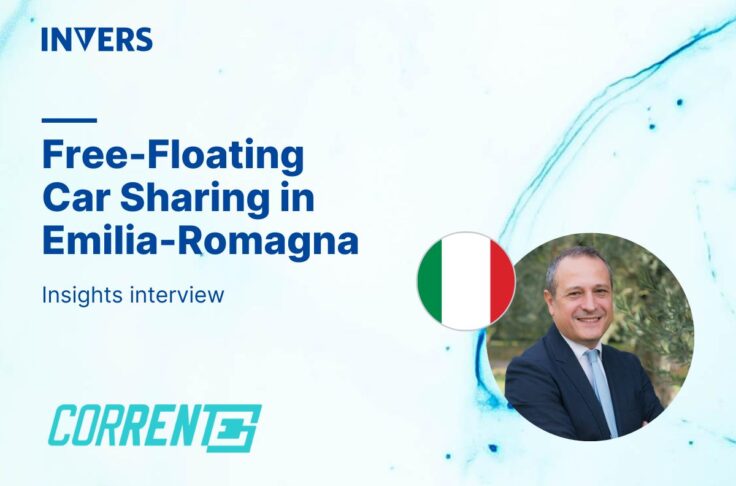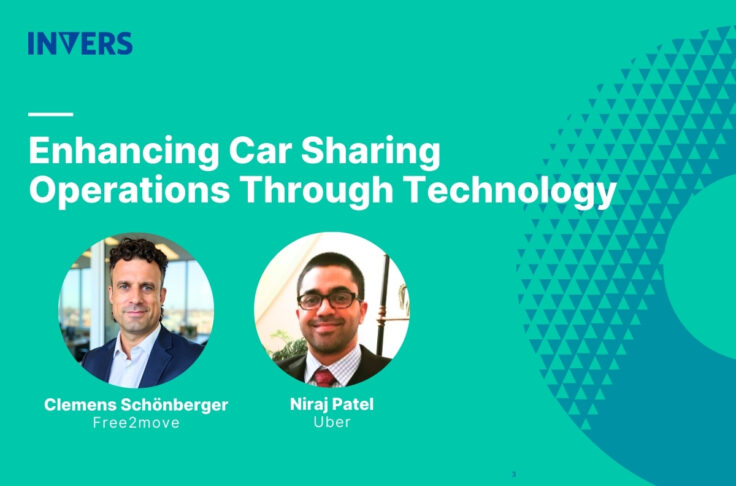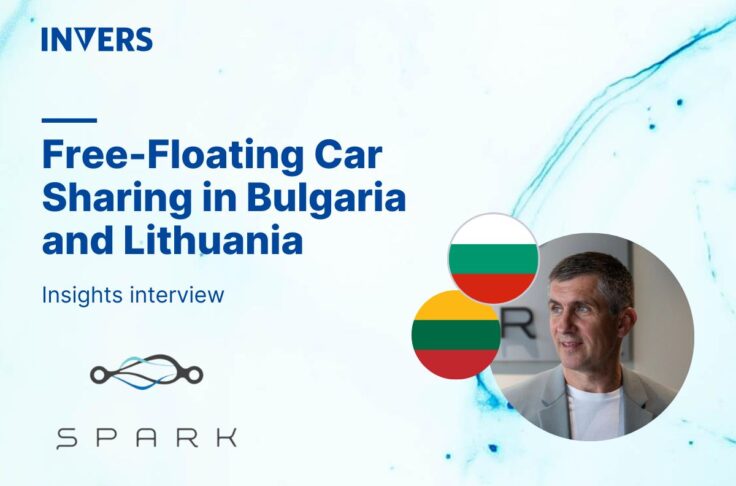Free-Floating Carsharing in Spain: An Insights Interview
Summary
The free-floating carsharing market in Spain is one of the Top 5 European markets. At the same time, the Spanish capital Madrid is also one of the global key cities for the sector. We asked David Bartolome, President at the Spanish carsharing organization AVCE & Business Development and Public Affairs Manager at Free2move, about the history, why Madrid stands out, milestones, and trends of free-floating carsharing in Spain.

Carsharing is booming. Many operators are reporting expanding fleet sizes and new record-high customer registrations. At the same time, the business models of operators are evolving and seeing new innovations. That is why INVERS launched the Mobility Barometer on European Free-Floating Carsharing on 04.05.23; a free-of-charge, 57-page report that helps carsharing operators quickly understand key market dynamics, insights, and trends.
Our Barometer also highlights statistics and findings from the Spanish market. The Spanish carsharing association AVCE not only represents the major free-floating operators, but also understands the market like no other. Therefore, we are happy to sat down with their President, David Bartolome, for this interview.
Who is AVCE and what is your aim?
The Spanish Carsharing Association (AVCE) was born in 2020 and aims to promote shared mobility and encourage its development, to make it accessible to all citizens promoting the environmental and economic advantages of this mobility solution.
At national level, AVCE works constructively to make its voice heard, and thus contribute to policy orientations related to shared mobility. At a more local level, AVCE’s mission is to raise awareness of the need and positive impact of carsharing in urban and metropolitan environments in terms of air quality improvement, mitigation of negative impacts of car ownership and its decarbonization potential. AVCE is an active agent that has the necessary knowledge to promote local initiatives aimed at facilitating the development of carsharing: provision of parking authorizations, reserved parking spaces on public roads, charging infrastructure, improved integration into the transport system and intramodality and, more broadly, any other measure that encourages a modal shift.
Can you describe the current free-floating carsharing landscape in Spain? In which cities can we find services and who are the main stakeholders?
Free-floating carsharing has been present in Spain for almost eight years, with “zero emission” vehicles exclusively. Seven players currently operate this model: Free2move, Share Now, Zity, Wible, GoTo Global, Voltio and Guppy, with a fleet of more than 3,000 vehicles, the vast majority in the capital, Madrid. Important Spanish and international corporations have entered the market, such as Stellantis, Renault, Ferrovial, Repsol, Kia, Mutua Madrileña, and Grupo Junquera. The model also exists in medium-sized cities in the North of the country.
Madrid is one of the most contested free-floating carsharing cities in Europe. What makes the city special?
Madrid is the largest city in Southern Europe, and is ideal for this model, with a huge population density. The public transport offer is excellent, which allows Madrid citizens to combine it with carsharing without missing private cars. On the other hand, historically Madrid has had air quality problems, so innovative mobility options are welcome to help mitigate the impact of private combustion vehicles use, while maintaining or even increasing citizens’ options for their daily mobility needs. The public space is limited and free-floating carsharing is understood as a sustainable way of using the available parking space efficiently (substituting space for private combustion cars with space for zero emission carsharing). The city council is implementing regulations that are progressively restricting parking and driving of polluting, private cars (most of all to those older than 10 years) and favor the deployment of free-floating carsharing.
In comparison to Madrid, what is different in Barcelona and other major cities in Spain? Why has free-floating carsharing not arrived there?
It’s a matter of political will. There is no favourable regulation for free-floating carsharing in Barcelona. Technically, their metropolitan area has similar characteristics to Madrid in terms of population size and density. However, in an important area of the city, the population density is even higher and public space is even more limited. This is understood as a problem in Barcelona. However, free-floating carsharing has proven to be a tool that helps to free up public space and offering a sustainable mobility option at the same time. It represents a great incentive for citizens who decide not to own a car, especially now with the new regulation on Low Emission Zones. Barcelona Mobility Policy in very focussed on increasing bike use and public transport, which is great, and yet I think that other tools that might help to increase quality of life, like free-floating carsharing, should not be neglected. I believe that the arrival of a sensible free-floating carsharing offer in Barcelona is a matter of time.
When did free-floating carsharing in Spain start and what where major milestones until today?
Free-floating carsharing has been present in Spain since 2015, exclusively with “Zero Emission” vehicles, which according to Spanish regulations are BEVs (battery electric vehicles) and PHEVs (plug-in hybrid electric vehicles). The vast majority of the fleet are BEV. The lack of public infrastructure has always been a major challenge, that has been solved with tons of creativity by the operators. The customer base grew quickly between 2015 and 2019, surpassing the 1 million registration mark. In 2019, free-floating carsharing expanded from Madrid to some medium-sized cities.
Looking beyond free floating, how would you describe the state of other carsharing models like station-based or Peer-2-Peer services in Spain?
If we compare Spain with other countries such as Germany or France, the number of available options for station-based carsharing or P2P is smaller, both in terms of number of operators and geographical footprint. This means that there is a huge potential for the development of these options. There are some very interesting cooperative models under development.
Which trends do you foresee for the free-floating carsharing market in Spain?
There is a certain market consolidation, some players have left the market and some players are joining forces, and at the same time, new players from diverse sectors keep on entering the market. So, we will continue seeing these fluctuations and new arrivals until the model eventually consolidates. On the other hand, as the Spanish market makes progress on electric mobility, not only in terms of infrastructure but also regarding culture of use, range anxiety, etc., we’ll see a broader adoption of free-floating carsharing for longer trips, and probably new models that operate electric microcars. The push for multimodality and integration into aggregator services will probably keep going. Finally, I am looking forward seeing an increased geographic footprint so inhabitants from more cities and regions would be able to enjoy the benefits of this model.
Further insights into free-floating carsharing
Thank you, David, for the great chat and this insightful interview.
For more information and interesting findings about free-floating carsharing, we encourage readers to check out our INVERS Mobility Barometer on European Free-Floating Carsharing that launched on 04.05.23 or the website of AVCE.


